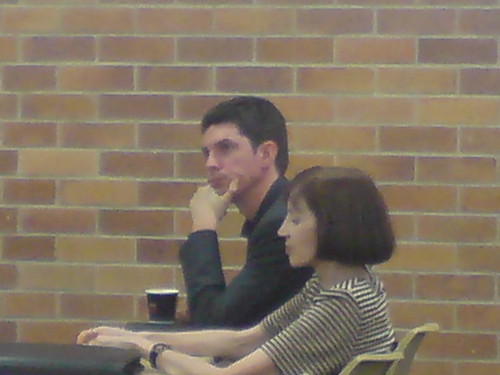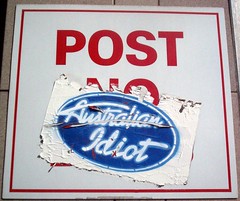Last night (Monday March 23rd, 2009), I went to the
National Human Rights Consultation session in Brisbane. It was quite interesting, although it had the limitations of a discussion based on Government and law, and the consultation process is also limited by the
terms of reference the Government gave it, which means they cannot recommend a Constitutionally entrenched bill of rights.
The four members of the Consultation panel are the Chair,
Frank Brennan,
Mary Kostakidis,
Tammy Williams, and
Mick Palmer. The consultation began with a speech by Tammy Williams who asked "What are our human rights - what exactly
are our rights and liberties?". Williams pointed out that our human rights are protected by a variety of different laws, or in some cases, by nothing in the law at all. She threw a couple of situations out there that go beyond "traditional" conceptions of human rights, including asking if people with diabilities should have the right to attend mainstream schools, or if married couples have the right not to be separated when they enter nursing homes.
Then Mary Kostakidis started to facilitate a discussion at the various tables (there were about 30-odd tables at the event with about 12 seats each). The first at-the-tables discussion was based on the
three key questions being asked by the Consultation:
* Which human rights and responsibilities should be protected and promoted?
* Are human rights sufficiently protected and promoted?
* How could Australia better protect and promote human rights?
At our table we introduced ourselves to each other and started to discuss these questions in a broad way. We had a human rights worker, one person with general interest in the field, one person (me) whose focus is more on what people need to do to stand up for their rights instead of relying on the law, one person who thought how we treat each other is important (and also access to secure, safe food), and one person who was a little skeptical of people's willingness to defend human rights.
After the table discussion, a microphone went around and people spoke from the floor. Comments from the floor included:
- Children being vulnerable after leaving domestic violence and taken into the care of potential abusers.
- One person said he was "skeptical of the process" and said the "human rights industry" was determined to introduce a charter which would be interpreted by judges.
Kostakidis then moved the discussion towards the specific question of "what rights ought to be included in the list of our rights?", which attracted the following comments:
- Rights of the disabled, especially those who can't articulate their own needs. Disabled people are often forced to live in nursing homes, or end up in prison.
- Rights to shelter, a fair trial, health, freedom and the rights of the unborn child.
- Rights of mentally ill people not to be shot by police. Right of physically disabled people to be treated equally in hospital.
- Anti-torture to be enshrined in Australian law
- Services are needed to teach immigrants with no experience of the rule of law, and no concept of it, what Australian society is like
We then moved onto another discussion at our tables, this time discussing each of the three questions (see above) in turn.
Question One: Which human rights and responsibilities should be protected and promoted?
Things that came up from our table included:
- focussing on the rights of all people, not just citizens (two of us (including me) agreed that, ideally, we'd tear down all borders - not that that's likely in the near future).
- We have a responsbility to defend our own rights - laws are useless without the will to stand up and use them.
- We need to stand up for those rights in UN conventions that Australia has already agreed to.
- Education and refugee rights
- We have a responsibility to help to empower those living under oppressive regimes.
- We have a responsibility to respect each other.
Question Two: Are human rights sufficiently protected and promoted?
This turned quickly into a discussion of when it is legitimate to suspend human rights, say in times of national emergency.
- Active citizenship is what is important here - people need to decide what they would do if they had responsibility for solving a problem so they can decide what is and is not justified.
- We need to be willing to take risks to defend our rights.
Question 3: How could Australia better protect and promote human rights?
Adopting a Human Rights Act
- Should such an act cover merely political rights and liberties (eg right to vote, free speech), or also social and cultural rights (eg rights to housing, food and language) as well? Opinions differed at our table.
- Government transparency and Freedom of Information Acts
- Should rights be in the Constitution or not? (despite the Government not being willing to allow the Consultation to recommend that).
After the table discussions, Mick Palmer facilitated a discussion where people stood up and said what had come out of their table discussions. Comments on this included:
Procedural rights, community rights, the danger of suspension of the rule of law, more resources are required, an independent judiciary and an ability to get your rights back when they are violated are all important. (Palmer commented that often procedural rights are good, EG in the
Cornelia Rau case, but they just get ignored).
- We need the ability to appeal abuses of human rights.
- Often procedural rights are NOT good enough, in the case of the disabled and mentally ill.
- Protection of the safety of those who work with the mentally ill if they are potentially violent.
- Human rights should never be suspended.
- In the case of war, for example, freedoms must be suspended.
- We need a responsibility for how our soldiers etc act when outside Australia.
- One woman complained that while immigrants get thier homes "completely fitted out", Australians going to the countries where those immigrants come from would get nothing.
- Judges should be the LAST line of defence against human rights abuses - human rights need to be so deeply ingrained in our culture and actions that rights abuses become rare.
- Civic leave from work should exist so people can join in taking action on things like human rights.
- There should be a free to air channel that shows G-rated programs until 10.30 at night.
- Rights can only exist if ones duties are carried out, especially our duty towards children.
- Home birth should be a right - there are planned new laws that will make home birth illegal by 2010 (Actually this is not true, a Maternity Services Review has issued a report whose recommendations, IF ADOPTED, would make home birth effectively illegal (by requiring midwives to have insurance which no insurance companies offer) - this is NOT the same as legislation being planned or introduced)
My thoughts on all this: I think the key is people being prepared to defend their own human rights, and the rights of others. I'm not so excited by the idea of a Human Rights Act - it can't hurt, but my ideal solution would be to entrench strong rights and freedoms in the constitution (eg the right to vote, the right to free speech, the right to freedom of and freedom from religion, and so on) and leave many other rights to the political process rather than producing a legal document. I think a manifesto of desired social and cultural rights, rather than a legal Act, is the right way to go.
Also, I thought the discussions at the tables were much more valuable than the individual people speaking up, as there was no way to get a real back-and-forth discussion going with 200 people there and only two hours time. It's a lot easier to see arguments and counter-arguments here, and to discuss them in the comments, then it was to discuss them last night - especially with so many people there to push specific agendas.
What do you think?











